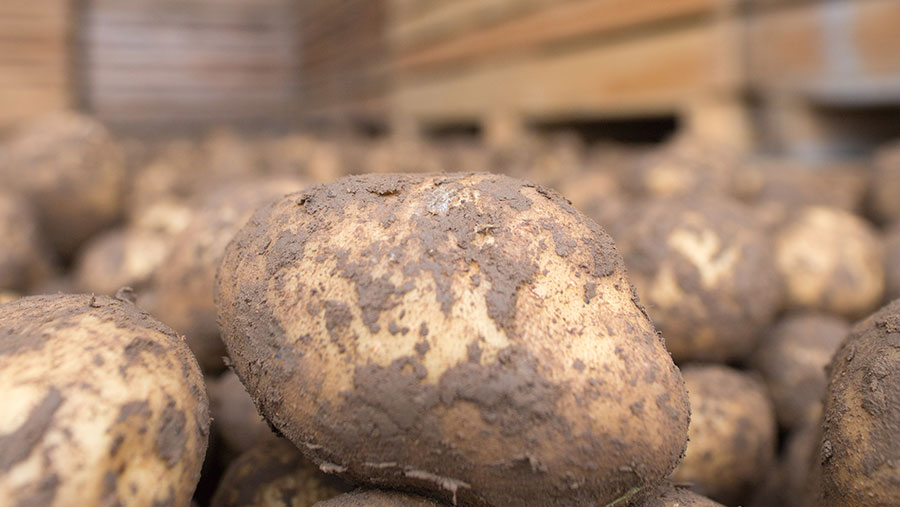Covid-19 and Brexit leave growers with high potato stocks
 © Tim Scrivener
© Tim Scrivener On-farm potato stocks remain well above the five-year average as the impact of Covid-19 restrictions and Brexit continue to depress sales.
According to the AHDB, 1.2m tonnes of potatoes remained in stores under grower ownership at the end of March – 90,700t higher than the five-year average.
The figure is marginally up (2,600t higher) on that for March 2020, when the first Covid-19 lockdown saw the food service sector collapse.
See also: Flooding aid package ends four-year fight for compensation
But stocks and prices vary hugely according to region and which sector a grower supplies.
Seed
Across Britain, seed stocks on 31 March 2021 were 40% higher than a year ago.
Scotland, which accounts for 70% of the GB seed area, held one-third (396,900t) of remaining stocks at the end of March.
This was 29% higher than the same date 12 months ago.
AHDB analyst Anthony Speight suggested that slow demand for seed on the home market, combined with an EU export ban since 1 January, had added to stocks.
The home market decline in seed sales was due in part to the difficulties faced by the sector during the lockdown periods in 2020, discouraging uptake for this growing season.
Packing
Levels of pre-pack potatoes in store were up by 25%, with 125,200t more packing potatoes in grower ownership than at the same time last year.
Demand for whites has been lacklustre for most of this marketing year, which is another factor in the high level of storage remaining in Scotland.
More than half of the planted area in Scotland relies on the packing sector.
Prices for whites were quoted by the Scottish Food Advisory Service (FAS) as very poor, at between £30-£60/t.
The FAS reported some 2020 crops were being moved out in bulk to clear stores as buyers expressed concern over deterioration and quality issues.
Prices in England were in a better range of £60-£120/t.
However, while whites were lower, Scotland and the rest of Britain have seen strong demand for Maris Piper, which has continued to firm throughout the second half of the marketing year.
In Scotland, prices for the variety are up to £300/t, while in England, values are slightly lower at £250-£300/t.
Processing and other ware
Stocks in this sector stood at 272,900t – down 236,100t on January’s figure and down 35% on the same time last year.
This is because almost all (96%) of 2020’s processing planted area was grown on contract and stocks continued to move off farm under an agreed time frame.
The decline in farm stocks may, therefore, mask rising storage at the processor plants as buyers seek to avoid quality losses, rather than a rise in consumer or food sector demand, Mr Speight said.
Outlook
New-crop planted area will be the focus point as the marketing year closes.
Planting has progressed well due to the dry April, but low temperatures will have implications for new-crop development.
This, in turn, could delay when it is lifted, potentially extending the length of 2020 crop marketing.
The area planted is likely to be down as prices are lower for most crops and seed export difficulties remain.
This, combined with positive news about Covid-19 restrictions and an increase in demand, could give some support to new-crop potato prices.
NI potato sector support
Northern Ireland’s potato growers are to receive financial support to compensate them for poor prices during the Covid-19 pandemic.
Department for Agriculture, Environment and Rural Affairs (Daera) minister Edwin Poots suggested the market for processing potatoes had been negatively affected since October 2020.
This was due to the closure of hotel and leisure businesses, which had caused the collapse of the food service sector.
The only option for many growers at this stage in the season is to sell their potatoes for livestock feed at significantly reduced prices, Mr Poots suggested.
“The support will be a contribution towards the verifiable losses incurred by these farmers for the second year in succession.
“It will help to address the cashflow difficulties and financial impact of losing valuable markets, and sustain their businesses,” he said.
However, Mr Poots stressed further work was required to finalise scheme details, including eligibility criteria, scheme rules and amount of support available.
Daera advises anyone forced to sell potatoes for stock feed rather than human consumption in the interim to retain evidence of sales to meet anticipated scheme requirements.
